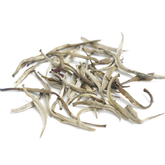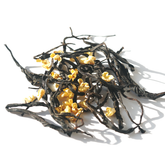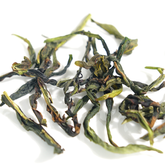Storing Tea Made Easy: Practical Tips for Chinese Tea Beginners
Many people might think that tea, like other foods, will "spoil" or go bad. However, rest assured, tea leaves do not quickly expire or produce harmful substances like milk or yogurt. If stored improperly, they will indeed rapidly lose their original aroma and vibrant flavor, becoming dull and lifeless. Therefore, proper tea storage is a crucial step to ensure you can enjoy the best tea flavor every time and maintain tea quality for a long period.

This article aims to provide foreign beginners with a simple and practical guide to storing Chinese tea, focusing on the six major types of Chinese tea . We will reveal the correct methods for tea preservation, helping you avoid common mistakes and ensuring your tea can maintain its best flavor for as long as possible.
The Essence of Tea Shelf Life
When we talk about food "spoiling," we usually think of milk turning sour or bread growing mold – states that make them harmful and inedible. But for Chinese tea, this is not entirely the case. The good news is that tea leaves will not become toxic or harmful after a period, unlike highly perishable foods. So, you don't need to worry about becoming ill from drinking "bad" tea.
However, it's important to clarify that while tea may not "rot," its quality will significantly deteriorate if stored improperly. Its unique flavor, vibrant aroma, and beautiful tea liquor color will rapidly fade.
This is akin to a delicate flower wilting – it hasn't "rotted," but it has lost its most appealing fragrance and vitality. Fundamentally, the aromatic compounds and active components within tea leaves are highly sensitive and easily affected by the following environmental factors.
How to Properly Store Tea
Avoid Light
Light accelerates the decomposition of aromatic compounds and oxidation within tea leaves. Oxidation alters the structure of these compounds, thereby damaging the tea's original fresh, floral, or mellow flavor, causing the tea liquor to darken and the taste to become flat or even dull.
It is essential to use an opaque, airtight container (such as ceramic canisters, tin, or stainless steel canisters) and store tea in a dark cabinet or pantry. Using transparent glass jars for storing tea is a highly incorrect storage method.
Prevent Moisture
Moisture is the primary cause of tea mold and flavor deterioration. Excessive humidity can activate residual enzymes in the tea leaves and provide ideal conditions for mold and bacterial growth. Once tea molds, it becomes directly spoiled and unfit for consumption.
Ensure your tea storage container is completely airtight to block out moisture. In humid environments, consider placing a small amount of food-grade desiccant inside.
Cool Environment
High temperatures significantly accelerate tea oxidation and aroma volatilization. Store your tea in a temperature-stable, cool, dry place, away from heat sources. Temperatures typically below 25 degrees Celsius (77 degrees Fahrenheit) are ideal.
Avoid Odors
The structure of tea leaves is highly porous, giving them strong absorptive properties. This makes them prone to absorbing surrounding odors, which can contaminate their pure flavor. Ensure your tea storage container itself is odor-free and store tea separately from all strong-smelling items.
Teas Requiring Refrigeration
Not all Chinese teas are suitable for storage at room temperature. Some tea varieties, due to their unique processing and high demands for freshness and aroma, require more specific storage conditions. Refrigeration is the best choice for them.

The two main categories of tea that typically require cold storage are Green Tea and Light-aroma Oolong Tea . This is because their fermentation level is very low, making them highly susceptible to oxidation.

Which Teas Have No Expiry Date?
In the world of Chinese tea, some teas possess collection value and do not have a defined shelf life. This phenomenon refers to specific tea types where, under correct storage conditions, their flavor and aroma will become more mellow, complex, and layered over time. These teas, in a strict sense, have no expiry date, and their value may even increase with age.

So, which Chinese teas possess this "improving with age" magic? They primarily include the following categories:
- Pu-erh Tea: Especially raw Pu-erh tea (Sheng Pu), when stored under appropriate conditions, undergoes a slow, natural fermentation and transformation. Its taste evolves from an initial astringency to become mellow and smooth, and its aroma develops a unique aged character. Pu-erh tea storage is a key factor here.
- Aged White Tea : Fresh white tea is known for its delicate downy fragrance and refreshing taste. However, after several years or even longer periods of storage, its aroma transforms into notes of jujube or medicinal fragrance, and the tea liquor becomes sweeter, richer, developing a unique aged charm. This highlights the concept of white tea aging.
- Dark Teas: Besides ripe Pu-erh tea , some other Dark Teas, such as Hunan Fuzhuan tea and Guangxi Liubao tea, also possess the characteristic of improving with age, with their flavors becoming deeper and more mellow. This also falls under dark tea aging.
It's important to note that having "no expiry date" does not mean they can be stored carelessly. The "improving with age" characteristic of these teas completely depends on extremely stringent and professional storage conditions, including appropriate temperature, humidity, and ventilation.

If stored improperly, they will still mold and spoil, losing their drinkable value, rather than becoming "more fragrant."
Optimal Drinking Time for Six Major Tea Types
While we often say that tea does not have a defined shelf life and won't spoil like other foods, different tea types do have an "optimal drinking time." During this period, the tea's flavor and aroma are at their best. Beyond this period, the teamay still be drinkable, but its quality and appeal will gradually decline.(Further Reading: Does Tea Expire? How To Properly Store Your Tea )
Do Tea Bags Expire?
Unlike loose-leaf tea, tea bags usually come with a clear expiry date or best-before date marked on their packaging. This is mainly because the tea leaves inside tea bags are typically more fragmented, making them more susceptible to oxidation. Also, the packaging of many tea bags is not as airtight or protective as professional storage containersdesigned for loose-leaf tea. While expired pure tea bags (those without added flavors) are generally not harmful to health, their flavor and aroma will significantly diminish, resulting in a bland and tasteless brew.(Further Reading: Do Tea Bags Expire? A Complete Guide To Tea Bag Shelf Life )
 However, if it's a flavored tea bag, it might contain other ingredients, and its shelf life will be affected by these components. Therefore, it's crucial to consume them within their stated expiry date.
However, if it's a flavored tea bag, it might contain other ingredients, and its shelf life will be affected by these components. Therefore, it's crucial to consume them within their stated expiry date.
Summary
Tea will not "spoil" like common food, but if stored improperly, its unique flavor and aroma will rapidly fade.
Remember the four golden rules of tea storage: avoid light, prevent moisture, ensure a cool environment, and avoid odors, and store your tea according to its type. Additionally, some teas also require refrigeration. The best practice is always to read the label information on your tea packaging, as qualified tea products will provide corresponding tea storage methods.
In our next article, we will continue your Chinese tea journey by delving into Gongfu Tea Ware Explained: A Beginner's Guide to Traditional Chinese KungFu Cha , providing clear and concise answers to help you better understand and enjoy Chinese tea. Stay tuned!





